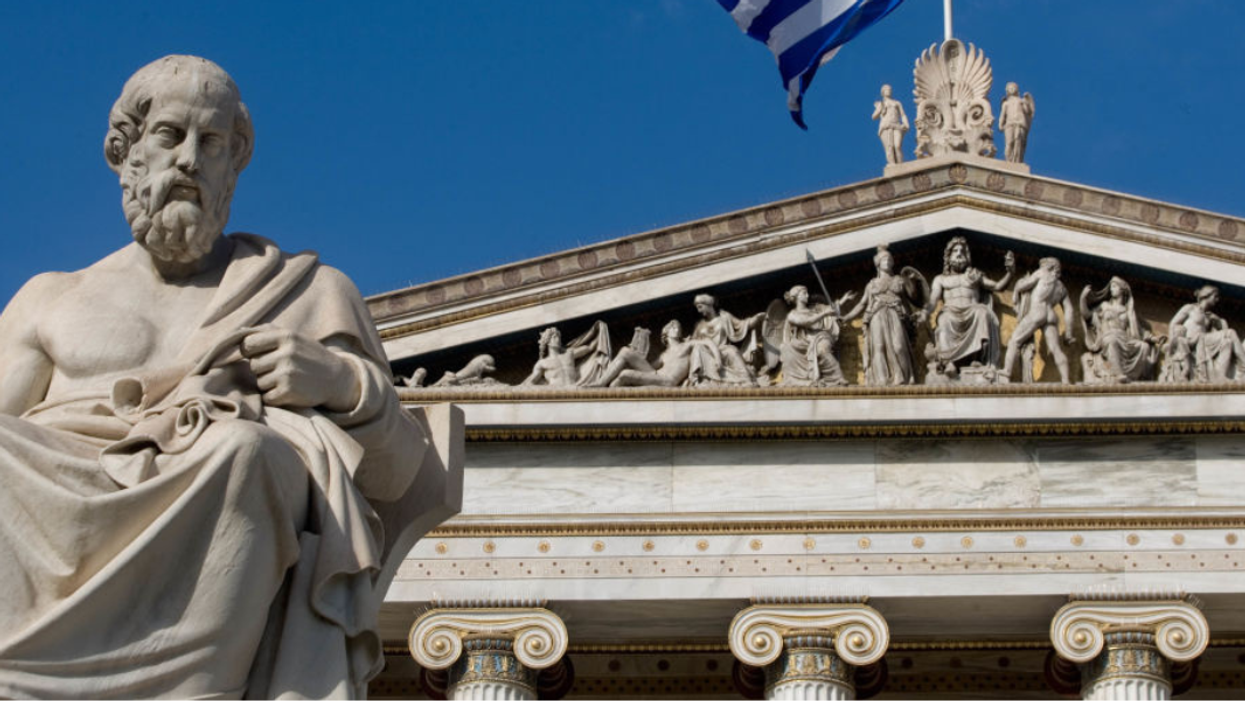Dr. Ryan David Leack teaches writing and rhetoric in the Dornsife College of Letters, Arts, and Sciences at the University of Southern California.
Traditional values are declining, according to a recent Wall Street Journal-NORC poll, indicating that few core beliefs unite us as a country. Congress mirrors these divisions. Partisan rifts seem rhetorically modulated, with emotion-charged language running high no matter the issue.
Tune into any political discussion today after a speech and the opposing party labels it empty rhetoric. The aim of such speeches is to persuade the audience of a certain view using rhetorical devices. Yet, if political discourse is steeped in rhetoric, how can we distinguish genuine sincerity from persuasive tactics? It seems we can’t. This type of rhetoric prevents genuine exchange. The question to explore is whether all rhetoric precludes compromise and fossilizes value judgments.
To understand the power and potential of rhetoric, we must return to its origin in ancient Greece. Aristotle knew that most people are persuaded by emotion rather than reason. That is certainly the predominant rhetoric in politics today in which former President Trump excels.
Before Plato and Aristotle arrived on the scene, during the height of radical democracy in 5th-century Athens, a ragtag band of men known as Sophists—literally “wise men”—dominated the political arena. Understanding effective or persuasive communication, they traveled through some 1,000 city-states, teaching young men how to argue effectively in public debates and preparing them for political life. In effect, they argue both sides of an argument to test ideas and arrive at the best course of action.
They also noticed that customs changed across city-states in ways that exceeded today’s red and blue districts. Although the Sophists shared no united doctrine—similar to the gulf between Democrats and Republicans—they employed complementary practices that, if used today, may aid stalemates across bipartisan biases, free speech debates, de-platforming, and so-called “cancel culture.” These situations have in common a core of rigid assumptions on all sides, not amenable to inquiry, exchange, and productive pressure.
Plato viewed the Sophists’ rhetoric as an impediment to the “truth.” Rhetoric, he believed, was only valuable if indexed to his question-and-answer, dialectical method toward truth. Ironically, Plato practiced the rhetoric he professed to abhor to lambaste the Sophists, efficiently lumping them together and denigrating them, thereby warping a venerable title into a contemptible one. Eventually, Plato’s repetitive harangues stuck, and they became known as cheats or wholesalers of words. Trump’s style of effortlessly denigrating his opponents, creating clever nicknames to demean them—“Lyin’ Ted,” “Crooked Hillary,” “Ron DeSanctimonious”—mimics Plato’s rhetoric.
And like Plato, Trump is certain of his truth. His dialogues exhibit, as rhetoricians know, an astounding skill in evading genuine pressure on assumptions and beliefs. Morality and truth, well-intended they may be, can impede and preclude this pressure, enabling one to fall back upon certitudes.
Could these Sophist-rhetoricians teach us something? Is a more constructive form of rhetoric possible?
The Sophists challenged conventional wisdom. The first Sophist, Protagoras, introduced the "man-measure” doctrine, where humans create and shape criteria for goodness. He argued that some views are "better" but not necessarily "truer" than others. Plato criticized his works as "mere relativism," and Athens' governing body was so threatened by his ideas that they burned his works.
In today's socio-political landscape, seeking truth may be too much to ask or perhaps too much of a distraction to initiate constructive dialogue. On recent abortion rights turmoil, for instance, how can we decide when life “begins” when there is no shared definition of “life” to start with? Truth here, like Protagoras said, is a matter of perception and definition.
Plato believed that Sophists made the weak argument stronger. The Sophists, however, provide a better method for our politics: a practice for exerting maximum pressure on convictions, placing arguments side-by-side, and seeing how they “measure up” to other measures, helping us determine what's best. Although it may not lead to absolute truth, aligning with probable reasoning ( eikos) like the Sophists did in the Dissoi Logoi could counter our partisan thinking by ascertaining what is “good enough” for action today.
Today’s politicians could learn from this method of arguing all sides of an issue. Imagine Speaker Kevin McCarthy advocating to raise the debt ceiling without conditions while President Biden seeks spending cuts. This approach, today called a "Steel Man" argument, led to the Sophists' infamy, but it also led to the defensive and prosecutorial modes of law, where even the “obviously” guilty deserve a defense.
We face in Trump and other rhetors who brand quickly and proffer easy answers to complex problems a modern-day Plato, thereby petrifying deep-rooted assumptions. We need a more sophisticated approach that pressures our convictions through listening to opposing sides. The famous 20th-century German philosopher Martin Heidegger redefined rhetoric as "the art of listening." This may open our ears to the value of community involvement, hard work, and tolerance, which have declined, according to a WSJ poll. To do this, we must be less Platonic and more Sophistic.



















Trump & Hegseth gave Mark Kelly a huge 2028 gift